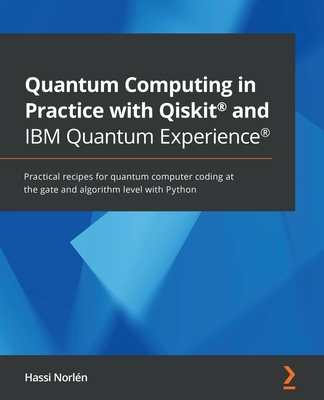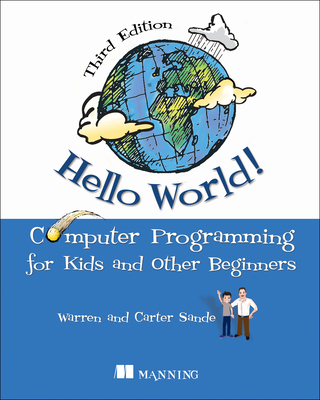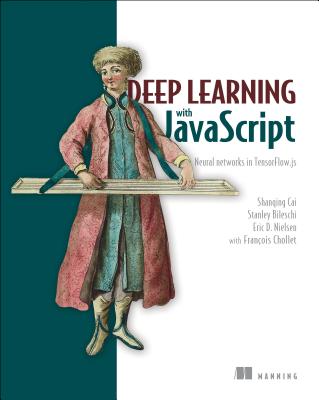Learn Quantum Computing with Python and Q#: A Hands-On Approach
暫譯: 用 Python 和 Q# 學習量子計算:實作導向的方法
Kaiser, Sarah C., Granade, Christopher
- 出版商: Manning
- 出版日期: 2021-07-15
- 定價: $2,100
- 售價: 9.0 折 $1,890
- 語言: 英文
- 頁數: 360
- 裝訂: Quality Paper - also called trade paper
- ISBN: 1617296139
- ISBN-13: 9781617296130
-
相關分類:
Python、程式語言、量子計算
-
相關翻譯:
量子計算 Python 與 Q# 編程實戰 (簡中版)
立即出貨 (庫存 < 4)
買這商品的人也買了...
-
 Quantum Computation and Quantum Information (Hardcover)
Quantum Computation and Quantum Information (Hardcover)$1,860$1,823 -
 Stochastic Processes: Theory for Applications (Hardcover)
Stochastic Processes: Theory for Applications (Hardcover)$3,800$3,610 -
 The End of Error: Unum Computing (Paperback)
The End of Error: Unum Computing (Paperback)$2,800$2,660 -
 Information Theory: Coding Theorems for Discrete Memoryless Systems(Paperback)
Information Theory: Coding Theorems for Discrete Memoryless Systems(Paperback)$2,150$2,107 -
 Quantum Information Theory, 2/e (Hardcover)
Quantum Information Theory, 2/e (Hardcover)$3,560$3,382 -
 The Theory of Quantum Information (Hardcover)
The Theory of Quantum Information (Hardcover)$1,680$1,646 -
 Quantum Information Theory: Mathematical Foundation 2/E(Paperback)
Quantum Information Theory: Mathematical Foundation 2/E(Paperback)$3,600$3,420 -
 $2,081Learning Chaos Engineering
$2,081Learning Chaos Engineering -
 人人可懂的量子計算
人人可懂的量子計算$354$336 -
 量子電腦程式設計 (Programming Quantum Computers: Essential Algorithms and Code Samples)
量子電腦程式設計 (Programming Quantum Computers: Essential Algorithms and Code Samples)$680$537 -
 量子電腦與量子計算|IBM Q Experience 實作
量子電腦與量子計算|IBM Q Experience 實作$580$458 -
 $1,242Quantum Computing in Practice with Qiskit(R) and IBM Quantum Experience(R): Practical recipes for quantum computer coding at the gate and algorithm le
$1,242Quantum Computing in Practice with Qiskit(R) and IBM Quantum Experience(R): Practical recipes for quantum computer coding at the gate and algorithm le -
 $611量子計算公開課:從德謨克利特、計算復雜性到自由意志
$611量子計算公開課:從德謨克利特、計算復雜性到自由意志 -
 Principles of Digital Communication (Paperback)
Principles of Digital Communication (Paperback)$980$960 -
 Quantum Computing in Action
Quantum Computing in Action$1,800$1,710
商品描述
Learn Quantum Computing with Python and Q# demystifies quantum computing. Using Python and the new quantum programming language Q#, you'll learn QC fundamentals as you apply quantum programming techniques to real-world examples including cryptography and chemical analysis. Learn Quantum Computing with Python and Q# builds your understanding of quantum computers, using Microsoft's Quantum Development Kit to abstract away the mathematical complexities. You'll learn QC basics as you create your own quantum simulator in Python, then move on to using the QDK and the new Q# language for writing and running algorithms very different to those found in classical computing. Purchase of the print book includes a free eBook in PDF, Kindle, and ePub formats from Manning Publications.
商品描述(中文翻譯)
《用 Python 和 Q# 學習量子計算》揭開了量子計算的神秘面紗。透過使用 Python 和全新的量子程式語言 Q#,您將學習量子計算的基本原理,並將量子程式設計技術應用於包括加密和化學分析在內的實際範例。
《用 Python 和 Q# 學習量子計算》增進您對量子電腦的理解,利用微軟的量子開發工具包(Quantum Development Kit)來簡化數學上的複雜性。您將學習量子計算的基礎知識,並在 Python 中創建自己的量子模擬器,然後轉向使用 QDK 和全新的 Q# 語言來編寫和運行與傳統計算截然不同的演算法。
購買印刷版書籍可獲得 Manning Publications 提供的免費電子書,格式包括 PDF、Kindle 和 ePub。
作者簡介
Christopher Granade completed his PhD in physics (quantum information) at the University of Waterloo's Institute for Quantum Computing, and now works in the Quantum Architectures and Computation (QuArC) group at Microsoft. He works in developing the standard libraries for Q# and is an expert in the statistical characterization of quantum devices from classical data. Previously, Christopher helped Scott Aaronson prepare lectures into his recent book, Quantum Computing Since Democritus. Sarah Kaiser completed her PhD in physics (quantum information) at the University of Waterloo's Institute for Quantum Computing. She has spent much of her career developing new quantum hardware in the lab, from satellites to hacking quantum cryptography hardware. Communicating what is so exciting about quantum is her passion, and she loves finding new demos and tools to help enable the quantum community to grow. When not at the keyboard, she loves kayaking and writing books about engineering for kids.
作者簡介(中文翻譯)
克里斯多福·格蘭德在滑鐵盧大學的量子計算研究所完成了量子資訊的物理學博士學位,現在在微軟的量子架構與計算(QuArC)小組工作。他負責開發 Q# 的標準庫,並且是從經典數據中進行量子設備統計特徵化的專家。之前,克里斯多福協助斯科特·阿倫森準備他最近的書籍《自德莫克利特以來的量子計算》的講座。
莎拉·凱瑟在滑鐵盧大學的量子計算研究所完成了量子資訊的物理學博士學位。她在實驗室中花了大量時間開發新的量子硬體,從衛星到破解量子密碼硬體。傳達量子技術的興奮之處是她的熱情所在,她喜歡尋找新的演示和工具,以幫助量子社群成長。當不在鍵盤前時,她喜歡划獨木舟並撰寫關於工程的兒童書籍。










